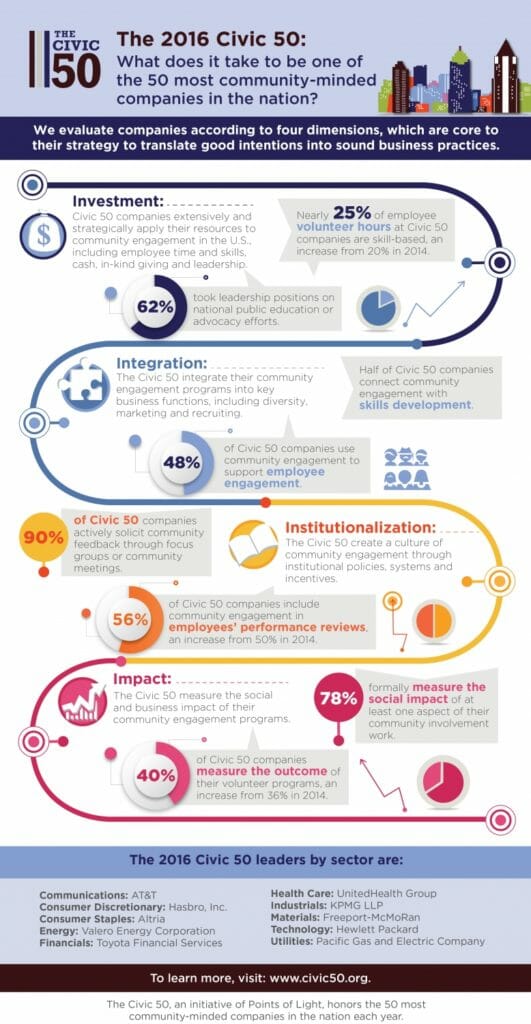What’s Their Secret? Lessons from the Most Community Minded Companies in America
This post by Tracy Hoover, Points of Light’s CEO.

Chances are that when you receive a package from UPS you don’t give a second thought to the complex logistics underway to deliver nearly 20 million packages a day. That’s because world class logistics is their expertise and core to their business strategy. But also core to UPS’ business strategy is a dedication to using that expertise to solve some of our world’s most pressing challenges.
When UPS employees learned that the inability to deliver life-saving medications results in millions of preventable deaths each year, they decided to act. This year, UPS will transform the delivery of humanitarian aid and life-saving vaccines by using drones. Through a new partnership with Gavi, the Vaccine Alliance, and Zipline, a robotics company, UPS employees will use drones to deliver vaccines to remote clinics throughout Rwanda. This cutting-edge partnership is a win-win for the people of Rwanda, for innovation at UPS, and for the talented employees who can do what they are really good at and save lives.
This is just one example of the many, many ways in which the companies on this year’s Civic 50 list are identifying the needs in their communities that are strategically connected to their business, and then aligning their community involvement and their employees’ skills towards those issues. These companies set the standard for good corporate citizenship across the country and demonstrate that service to others has become a fundamental part of successful businesses spanning every sector of the American economy.
Founded in partnership with Bloomberg and the National Conference on Citizenship in 2012, this annual survey and resulting top 50 list honors a culture of social responsibility in business. The survey considers four aspects of each company: its investments in the community (measured largely in volunteer hours, pro-bono donated talents, in-kind donations, money contributed to charity and leadership); the degree to which the company integrates its community service programs with key business functions; the ways in which community engagement is institutionalized as part of the business itself (for example, included the company’s mission statement); and how it measures the social and business impact of the company’s community involvement.
Civic 50 companies have gone beyond simply opening their checkbooks and are employing an “all-of-the-above” approach to community engagement — integrating input from employees, customers, and their local communities into everything from their employee handbooks to their workplace culture to their product design. As a result, Civic 50 companies are putting themselves at the center of change to create more enduring and sustainable business models.
Here’s a snapshot of how the Civic 50 are doing it:
- 90% have a formal, structured effort to solicit community feedback.
- 78% included community engagement on department scorecards. This was an increase from 70% in 2014.
- 56% included community engagement as a formal written component of employees’ performance reviews. This is an increase from 50% the previous year.
- 62% said they took a leadership position on four or more national public education or policy advocacy efforts.
- Half use community engagement to support skill-development for employees, an increase from 46% in 2014.
- Nearly one-quarter of employee volunteer hours are skill-based. This represents an increase from 20% the previous year.
- The top five business functions that their community engagement programs support are: diversity and inclusion, recruiting, stakeholder relations, marketing/PR, and employee engagement.
This year’s Civic 50 winners demonstrate that they are doing the hard work of building more community-minded businesses, and that the business sector plays a critical role as a catalyst for civic engagement. This is big news. Increasingly, American businesses are partnering with government, nonprofits and individuals to solve the biggest challenges facing our communities. Both socially-minded employees and consumers are driving businesses to place social-oriented values at the center of their operations. This ingrained ethic of service helps socially responsible businesses recruit better employees, build customer loyalty, find bottom-line rewards, and become better corporate citizens.
Check out this year’s Civic 50 and join us September 8th for this webinar to get an inside look at the secret sauce that helped these companies make the list.

